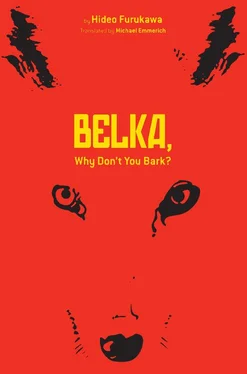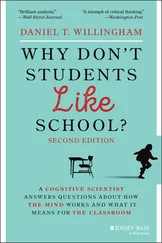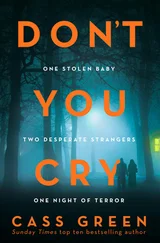Hideo Furukawa - Belka, Why Don't You Bark?
Здесь есть возможность читать онлайн «Hideo Furukawa - Belka, Why Don't You Bark?» весь текст электронной книги совершенно бесплатно (целиком полную версию без сокращений). В некоторых случаях можно слушать аудио, скачать через торрент в формате fb2 и присутствует краткое содержание. Город: San Francisco, Год выпуска: 2012, ISBN: 2012, Издательство: Haikasoru, Жанр: prose_magic, Современная проза, на английском языке. Описание произведения, (предисловие) а так же отзывы посетителей доступны на портале библиотеки ЛибКат.
- Название:Belka, Why Don't You Bark?
- Автор:
- Издательство:Haikasoru
- Жанр:
- Год:2012
- Город:San Francisco
- ISBN:978-1-4215-5089-3
- Рейтинг книги:4 / 5. Голосов: 1
-
Избранное:Добавить в избранное
- Отзывы:
-
Ваша оценка:
- 80
- 1
- 2
- 3
- 4
- 5
Belka, Why Don't You Bark?: краткое содержание, описание и аннотация
Предлагаем к чтению аннотацию, описание, краткое содержание или предисловие (зависит от того, что написал сам автор книги «Belka, Why Don't You Bark?»). Если вы не нашли необходимую информацию о книге — напишите в комментариях, мы постараемся отыскать её.
https://www.youtube.com/watch?v=ay_DcZ6RDFA https://www.youtube.com/watch?v=Orvqrqjk9pU
Belka, Why Don't You Bark? — читать онлайн бесплатно полную книгу (весь текст) целиком
Ниже представлен текст книги, разбитый по страницам. Система сохранения места последней прочитанной страницы, позволяет с удобством читать онлайн бесплатно книгу «Belka, Why Don't You Bark?», без необходимости каждый раз заново искать на чём Вы остановились. Поставьте закладку, и сможете в любой момент перейти на страницу, на которой закончили чтение.
Интервал:
Закладка:
The cliff you had climbed, and from which you had fallen into the tunnel that plunged into the permafrost, was on the left of the Lena River, facing downstream. On the western bank. The cliff jutted up, almost vertical. The days were short at this time of the year, but the sun did rise. And when it did, the morning sunlight shone on that cliff. There came a moment when the light streamed in through a crack near the tunnel’s entrance.
It shot in at an angle, and for ten or twenty minutes, no longer, there in the pure darkness, the faint glow filled you.
You started and came to.
Who knows, maybe you had been asleep.
You noticed the sunlight bleeding into the space you were in.
IT’S MORNING, you thought.
And then, the next moment, you stiffened, stunned. Because you had discovered something. Immediately overhead—though of course you had no idea how you had landed, what was up and what was down—was an eye. A mammal’s eye. Enormous. Just one, one side of the head: an eyeball. It had to be a few times larger than your own, Anubis, or even bigger… maybe ten times bigger.
The eye stared down at you from directly overhead.
From within the ice.
You were face to face with a prehistoric animal encased in the permafrost. Suspended along the edge of the tunnel, inches away. It had tusks. Long, curved tusks. A long nose. Its body was covered in long fur. It was over eleven feet tall. Alive, it would have weighed six tons. It was something like an elephant that had lived ten thousand years ago, even longer ago than that, and had evolved to live in the cold. An enormous mammal, given the name “mammoth” by a French scientist in the eighteenth century.
One of these extinct creatures had been preserved, frozen, in the tunnel.
In the ground. In a layer of Siberian permafrost more than 160 feet thick.
Without decaying.
And now, Anubis, its huge eye, more than ten thousand years old, stared down at you.
WHO ARE YOU? Anubis asked.
WHO ARE YOU ? The question bounced off the ice.
I’M… I’M A DOG.
The eye in the ice was not, of course, a dog. So it didn’t answer.
HAVE YOU BEEN THERE ALL ALONG? Anubis asked.
I’VE BEEN HERE ALL ALONG.
This time, the frozen earth answered. It transmitted the ice-packed mammoth’s answer to the dog’s mind: I’M FROZEN.
YOU’RE AN EYE. Anubis told the eye, very simply.
I’M AN EYE. The mammoth agreed, very simply.
YOU’RE LOOKING AT ME.
I’M LOOKING AT YOU.
AM I… ALIVE?
YOU’RE… ALIVE.
WILL I LIVE?
LIVE.
Anubis’s final question, rebounding off the ice, was transformed into a command. Anubis interpreted what he had heard as a command. He realized that this enormous eye, no one else, was his true master. It was not a dog. The eye (and the creature whose eye it was) had not said it was a dog. But neither was it a human. Anubis realized, then, at that moment, that this thing was his Absolute.
Anubis had no word to express his discovery.
Perhaps a human might have called this thing the “Dog God.”
And so Anubis, whose name itself means the “Dog God,” acknowledged this “Dog God” as his true master, and awoke.
Anubis, Anubis, at last you have awoken.
You were not asleep.
Ten minutes, twenty minutes passed. The brief period during which the tunnel filled with the morning sun’s faint glow was over. Once again pure darkness enclosed you. Your encounter with your true master had ended. What would you do? Obey the command you had been given, of course. The order. One simple word: LIVE. Already, you were trying. You had to break free. You twisted your body, twisted further. You moved. You slipped. You slid down the wall of the tunnel, you fell. But you weren’t afraid. The tunnel did not injure you. You descended.
Into a space .
You searched for your old master.
You looked for that idiot human.
You found him, deep in the tunnel, barely breathing but alive. Too weak even to groan. You were hungry. You knew you would need to build up your strength if you were going to escape from this place. So you saw him as food. You gorged yourself. There was nothing wrong with this. It had happened once before… then too, you’d had no choice; you had sated yourself on your former master’s corpse. You had been eleven months old, or maybe a year. It was the first time you had ever set foot on the Arctic Ocean, and you had almost died. You had eaten your master in order to survive, as if it were a sort of sacred rite. You had eaten that human, that former idiot. Then too. If there was a difference between this time and the last, it was that last time your “former master” had been wholly dead, whereas this master was still slightly… still breathing, barely. There was nothing wrong with that. You could stop his breathing.
Right?
RIGHT, you reply, to someone. To whoever it is that puts the collar on your moral sense. YES, THAT’S RIGHT, you said and put an end to it, and sated yourself on the flesh.
You wandered, step by step, slowly, through the bowels of the earth. The crevice in the permafrost was narrow, but it branched out in all directions, north and south and east and west, diagonally up and down, in shapes nature had determined. There were blind alleys, of course, and forks that led into loops. But you, Anubis, had a fine sense of smell. You had a dog’s nose, and you sniffed the ground with it. You had an animal’s persistence. You didn’t mind trying and failing and trying again.
You made it out in two days.
So you lived. Because this was the command your true master had given you. You would not return to the Arctic Ocean. You understood: I’M NOT A DOG OF THE ARCTIC OCEAN, NOT NOW. It wasn’t logic that told you this. You had once devoured the flesh of your dead master, the musher, in order to survive, to go out onto the Arctic Sea. Now, once again, you had eaten the flesh of your master, another sled driver—once again, you had performed the rite. The two rites formed a pair. I CAME HERE, AND NOW I WILL LEAVE. Yes, Anubis, by the time you made your way aboveground, you had already grasped the meaning of those two rites. In your heart, you understood. It wasn’t a matter of logic. This time, you would head south.
Your talents as a hunter served you well. There on the Arctic Ocean, hunters living in polar regions kept you with them, and you learned to find prey, chase it down, attack it. You honed your fighting instincts, improved upon your natural abilities as a wolfdog. Here your prey were not musk oxen. You didn’t hunt polar bears. But the procedure was essentially the same. It was practice. You learned to read the weather outside the Arctic Circle. And what did you like to eat, Anubis? Reindeer. Reindeer were abundant in the tundra far to the south of European Russia, and in that special variety of Siberian forest known as the taiga. Some were wild, some were domesticated. In spring and summer, you would encounter herds of several thousand in the wetlands bordering the Lena, property of the nearby sovkhoz . You attacked. You took the reindeer down with the greatest of ease. You gobbled their innards, and their stomachs were stuffed with moss—a kind of lichen known as “reindeer moss.” Their stomachs were green. You smeared those bags with fresh red blood as if it were a sauce and savored the dish. Meat, blood, vegetable matter. The perfect combination of protein, minerals, and vitamins. The ultimate one-dish meal. When you had eaten your fill, you bayed. Your baying rang across the vast Siberian expanse. You might as well have been a pureblooded wolf.
A pureblooded wolf?
But you weren’t. You were a half-breed.
You didn’t care about that stuff.
Strength was everything. The resilience to go on living, living, living. As a dog. As a dog, but also as a family tree. Yes, Anubis, you were one dog, but you were also a lineage. Your line began with Kita, a Hokkaido dog, and then your “father,” some nameless wolf roaming Alaska and the Arctic Circle, added his blood to the mix. That was how you were born. And your seed would grow the tree. You were an individual dog, but you were also a family tree.
Читать дальшеИнтервал:
Закладка:
Похожие книги на «Belka, Why Don't You Bark?»
Представляем Вашему вниманию похожие книги на «Belka, Why Don't You Bark?» списком для выбора. Мы отобрали схожую по названию и смыслу литературу в надежде предоставить читателям больше вариантов отыскать новые, интересные, ещё непрочитанные произведения.
Обсуждение, отзывы о книге «Belka, Why Don't You Bark?» и просто собственные мнения читателей. Оставьте ваши комментарии, напишите, что Вы думаете о произведении, его смысле или главных героях. Укажите что конкретно понравилось, а что нет, и почему Вы так считаете.












